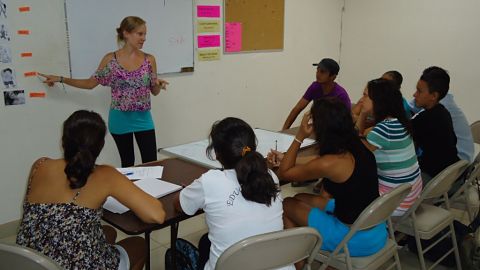Teaching English in Costa Rica – The reasons a person decides to move abroad to teach English in Costa Rica are many. For some it’s a gap year after university. For others it’s a first step in retirement. Others simply like the idea of escaping the cold winds of winter for a few months. Whatever the motive, the time of year that you decide to take the leap to Costa Rica should ultimately depend on what end you expect for yourself once here.
 Just like there are high and low seasons for tourism, the ESL industry in Costa Rica also has points that are much busier than others. These are the end of January and the beginning of July.
Just like there are high and low seasons for tourism, the ESL industry in Costa Rica also has points that are much busier than others. These are the end of January and the beginning of July.
The end of January is when everything has finally settled down after the Christmas/New Years break. In Costa Rica, and all of Latin America for that matter, Christmas can be considered a five month affair. With Independence Day in Costa Rica on September 15th, as soon as the 16th you can see Christmas decorations going up in stores and homes across the country. Without a significant holiday between Independence Day and Christmas, the festive anticipation ramps up very early.
With the entire country essentially shutting down for all of December, the ESL market goes with it. It takes until the end of January for people to settle back in but, once they do, the market takes off. The third week of January means back to business and everyone brings their New Year’s resolutions of learning a new language with them. This peak goes strong until April, when the surge is interrupted by another significant holiday: Semana Santa.
July marks the start of the other peak season, which runs until the end of November. With language schools doing most of their hiring in anticipation of these two peaks, those teachers looking to secure employment with the most hours should apply – or move to Costa Rica – just before January and July.
In comparing the two peaks of the ESL hiring season, January is by far the most saturated in terms of people arriving to Costa Rica. With it being winter in North America, the best weather in Costa Rica, and a fresh calendar it is the logical time to arrive.
Given this, a December arrival – and a November TEFL/TESOL course – is often ideal. A common trend to get a leg up on your competing applicants is to spend the month of November getting certified, using December to get your bearings and apply for jobs with the goal of starting to work when the market picks up steam in January. A late December or January arrival is often too late as many institutes do their hiring for the following year in the month of December.
With this said, securing a teaching job with 20 hours or more isn’t the goal of everyone. For teachers looking to move to Costa Rica to enjoy a more relaxed atmosphere – and teaching more for enjoyment rather than dependence on the paycheck – coming in the low seasons may be more beneficial.
Contrary to popular belief, jobs can be had in low season; the hours – and subsequently the earnings – will just not be enough to live off of. However, for many teachers in Costa Rica, money is not the primary objective. For many, this avenue of less is more is the better option. The pay is less, but so is the traffic, cost of living and beach congestion. If the experience of living abroad is what you’re looking for, and using a teaching job to pay the rent, then perhaps coming in a time not often associated as ideal might be a better fit.
January and July are the peak seasons of the ESL market in Costa Rica. If you’re looking to secure a job at those times, you’d be wise to arrive at least a month prior to your preferred start date. Coming in low season allows for more flexibility in terms of arrival date with the trade off of fewer employment benefits. When you decide to buy your ticket simply depends on what you expect from your time in Costa Rica.
If you want more information about teaching English in Costa Rica or getting your TEFL or TESOL certificate in Costa Rica feel free to contact Andrew at the Global TESOL College or email andrew@globaltesolcostarica.com
Originally from Toronto, Canada, Woodbury is the academic director of Global TESOL College Costa Rica , a contributor to radio program This Week in Costa Rica (http://thisweekincostarica.com/), and an independent writer based in Costa Rica.

